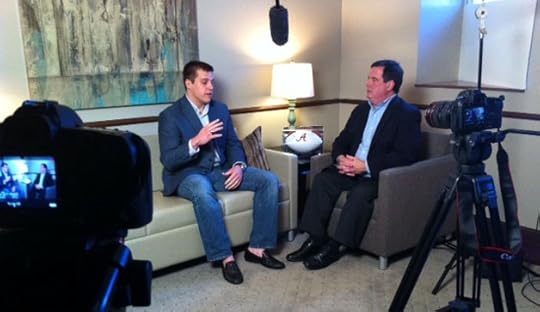Tornados, Tragedies, and Triumphs: Carson Tinker’s Story
One of the greatest disasters in the history of the United States took place from April 25 to 28, 2011. During those four days, 358 tornadoes were confirmed, and 348 people died as a result of the storms. During that time four EF5 tornadoes were confirmed, a highly unusual occurrence since typically no more than one of these powerful tornados will be confirmed in an entire year.

Carson at LifeWay.
Among the devastation and death, one of the many stories that emerged was that of Carson Tinker, a football player for the University of Alabama. As the tornado roared through Tuscaloosa, Carson and his girlfriend, Ashley Harrison, huddled together. They both were tossed significant distances by the tornado. Carson was seriously injured and Ashley died.
I recently had the opportunity to interview Carson Tinker. His story is far more than the tragedy of the tornado. Indeed the greater story is his victory over adversity, and the life lessons he learned from an incredible year.
We at B&H Publishing, a division of LifeWay, are excited that Carson will soon be telling that full story in an upcoming book to be published in March 2014, with pre-release purchases available this coming fall. Here are some excerpts from my interview with Carson.
Carson, the book you are writing begins with the tornado on April 27, 2011, and concludes with Bama’s BCS national championship on January 9, 2012. Give us a quick overview of that year.
Carson: More than anything else, I came away from that year with an incredible life lesson. You are not defined by your circumstances or adversity. You are defined by how you respond to them. I don’t want to be defined by the tornado. I want to be defined by how I responded to the challenges. You can live in circumstances or you can live in vision. I choose to live in vision. Coach Saban always teaches us that we are defined less by the problems we encounter than how we respond to them. In 2011 we lost a tough regular season game to LSU. Immediately after the game, Coach Saban told us that we could be defined by the loss or by how we respond to the loss. He said we still had the opportunity to be something special. We were fortunate that a couple of other teams would eventually lose. Because we responded well to the loss, we had the chance to play for the national championship on January 9, 2012 against LSU. In the rematch we won the title.
Since your upcoming book looks at the entire 2011 season, does it focus on a few games like the two LSU games?
Carson: No, the book is about every game and how we move forward from adversity to victory. In fact, the opening game on September 3 was very special to me. After all the injuries and challenges I had, I was back on the field ready to play football. Coach Saban said that the city of Tuscaloosa and all the Alabama fans were ready to return to some sense of normalcy after the devastation of the tornado. We began asking ourselves as a team what was normal for us. We won 36 games the previous three years, a college football record. So our normal had to be winning all of our games and the national championship, but we took each game one at a time. It was part of the process that Coach Saban describes. We learned greater perseverance. We learned greater teamwork. We learned to overcome.
Your faith is an integral part of your life. Describe how your faith sustained you that year.
Carson: I grew up in church, and I was saved as a Christian at eight years old. I read the Bible regularly. But I saw my faith become real after the tornado. I understood that, in the midst of great adversity, God will strengthen you. In 1 Samuel 30, David and his men return from battle to discover that Amalekites had taken all of the women and children. David’s soldiers wanted to stone him. But David strengthened himself in the Lord. When I was struggling and down, I strengthened myself in the Lord. And I really began to see that some of the principles of being a great believer are played out on the football field: courage, perseverance, faith, and others.
Talk about the life of a long snapper. You started as a walk-on player, and you earned a scholarship and won three national championships.
Carson: I love it. I have the responsibilities of snapping and blocking. I played on the offensive line in high school, but I knew I wasn’t big enough to play on the line in big football programs. So I honed my long snapping skills. I was redshirted my freshman year and learned a lot from other players. I was starting by my sophomore redshirt year.
I saw every game you played, and I don’t recall your making one bad snap. Did you?
Carson: No sir. I took a lot of ownership and pride at what I did. Coach Saban calls it “mastering your craft.” I also tried to take a leadership role. The regular starters typically play 60 to 70 plays, but I only played 12 to 15 plays a game. So I saw my role to be an encourager to the other players as they were getting tired. I was passionate about it. And in the offseason, I worked just as hard as the other players. I think that lifted them up as well.
In summary, Carson, what do you want readers to know about your upcoming book?
Carson: First, this book is not just about football. I want anyone to be able to pick it up and be encouraged, challenged, and inspired. Though I’m still relatively young, I’ve had some experiences in life that I think can be an encouragement to others. Both of my parents had cancer when I was young. I’ve been through the tornado and the rehab. And I’ve seen what victory looks like on the other side. In Exodus 17, Moses is leading the Israelites to fight the Amalekites. As long as Moses keeps his staff raised, the Israelites are winning. But when he got tired and the staff began to drop, the battle turned for the worse. So Aaron and Hur held his arms and lifted the staff up, and the battle was won. One of my goals on the football team was to lift up the leaders on the team. That is my goal in life. And that is my goal through this book.

My Interview with Carson.



